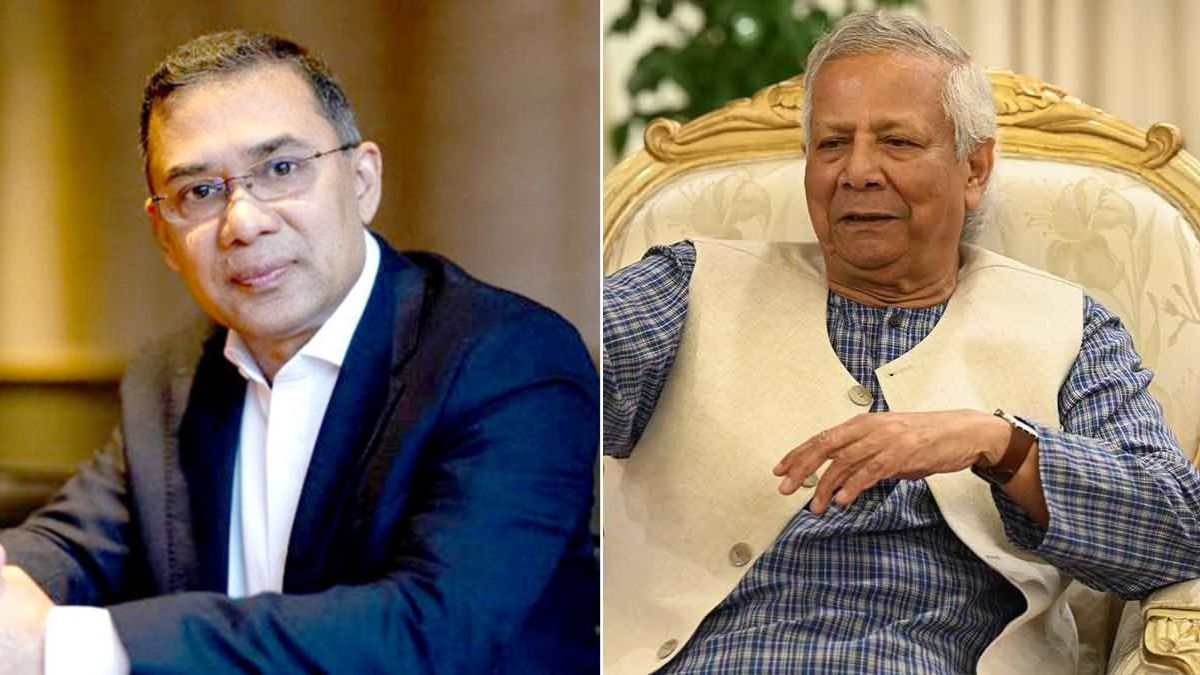Will Tarique Rahman return to Dhaka in July? London talks with Muhammad Yunus can unlock middle ground for Bangladesh polls
 Tarique Rahman and Muhammad Yunus | X, Salil Bera
Tarique Rahman and Muhammad Yunus | X, Salil Bera
The proposed face-to-face meeting between Professor Muhammad Yunus and BNP acting chairperson Tarique Rahman in London on June 13 could become a defining moment in Bangladesh’s path toward a democratic transition. If both leaders are on the same page, they could together write the next chapter of Bangladesh politics. But if there is a stalemate, then prolonged uncertainty can be troublesome for both sides.
This will be the first in-person meeting between the two, and its potential significance is not lost on either side. The initiative for this meeting reportedly came from individuals close to Professor Yunus within the interim government, as well as from a section within the BNP that wants to end the prolonged political uncertainty. Their shared aim is to clear the current atmosphere of distrust and work toward peaceful, inclusive, and credible elections in the coming months. The meeting also comes in the backdrop of Professor Yunus’s recent suggestion that national elections could be held in April 2026. This has been firmly opposed by the BNP, which has long maintained that elections must take place in December 2025.
A possible compromise now being floated is a February 2026 timeline-just ahead of the holy month of Ramadan. If both sides can agree to this, it could become a workable middle ground that allows the interim administration to exit gracefully, while giving the opposition space to re-engage electorally. This compromise, if realised, could help rebuild trust and bring clarity to the transition from an interim government to an elected one.
Sources familiar with developments said there are concerns of Professor Yunus facing increasing isolation from wider political engagement, a situation reportedly being created by vested interest groups who are believed to benefit from the continuation of the interim set-up. However, Yunus has communicated, in private and public, that he does not wish to remain in his role beyond June 2026-a position he continues to maintain.
“All noise will be minimised if the meeting between Professor Yunus and Tarique goes well. Trust is a big variable in this relationship. If there is trust, even complicated issues can be resolved. Without trust, even the simplest things become complicated,” said a person familiar with the developments.
Beyond the question of the election timeline, the London meeting could serve as a reset in relations between the interim leadership and the BNP. It could mark the beginning of an understanding that ensures a smooth, democratic transition and puts an end to escalating tensions.
That said, Yunus’s recent public remarks have invited sharp criticism from some quarters within the BNP. His comment suggesting that “people may not understand” what they are voting on during the ongoing reform process was interpreted by a section of the party as an affront to voters’ intelligence and democratic rights. Still, the BNP leadership has chosen not to escalate the matter, stating that they remain open to dialogue and ready to move forward with a clean slate-if the government demonstrates willingness to correct course.
In what is being seen as another crucial step forward ahead of the London meeting, Home Affairs Adviser Lt. General (Retd.) Jahangir Alam Chowdhury said on Thursday that there is “no obstacle” to Tarique Rahman’s return to Bangladesh. He confirmed to journalists that Tarique, who has lived in London since February 2008, is free to return whenever he wishes. This has opened doors for Tarique’s return to Dhaka as early as July, sparking hope within the BNP ranks who believe his return will energise the party base and create momentum toward restarting the democratic process. For now, all eyes are on Professor Yunus’s readiness to engage and making the best of this opportunity.
World